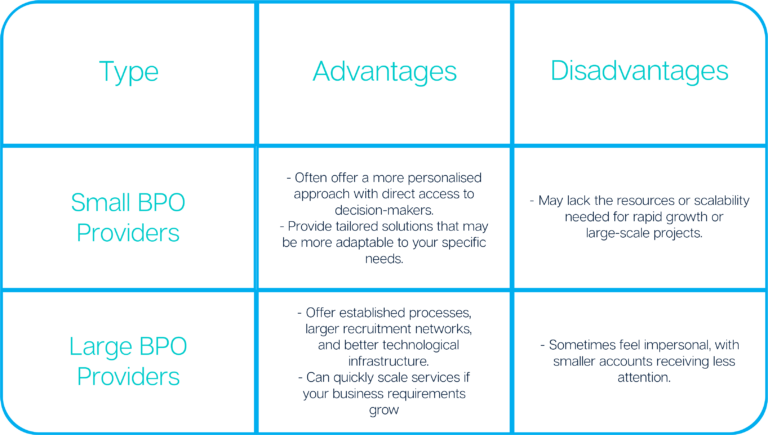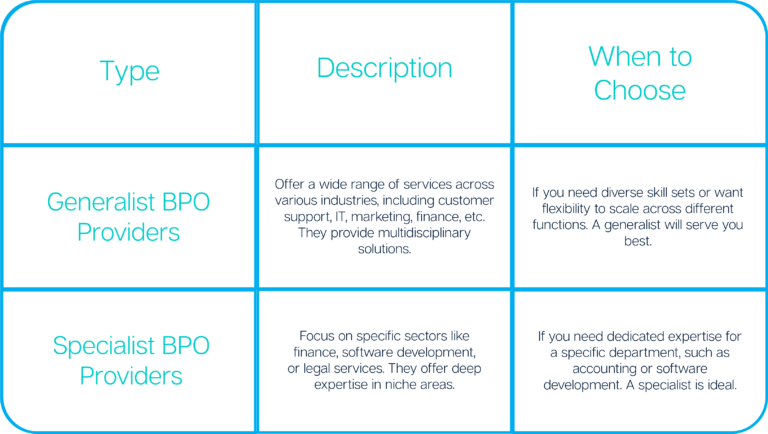After years of working in the offshore industry and feeling first-hand the pros and cons of BPO provider, it’s time to set the record straight to help you work out who’s worth their salt and who to avoid.
Finding the right BPO provider can be daunting. With a quick Google search, you’re inundated with companies in the market all offering offshore staff with slightly different flavours and benefits. Identifying which one best fits your business requires careful consideration and planning.
To help you out, I’ve put together my guide from what I’ve learnt over the years on what really matters to your business when selecting the right partner for you. Let’s break it down.
Generalist or Specialist? – What Type of BPO Provider Do You Need?
Choosing the right BPO provider starts with understanding whether you need a generalist or specialist provider. This distinction is critical because it influences the provider’s expertise, flexibility, and ability to meet your specific needs.

Pro Tip: Ask each BPO provider about their experience within your industry. Even generalist providers can excel if they have relevant case studies and proven success in your sector.
Recruitment Capabilities – Can Your BPO Provider Find the Right Talent?
Probably the MOST important part of your success with an offshore partner is if they can find and engage the talent you need. Your provider’s ability to recruit and retain top talent is fundamental to your success. Talent acquisition in the Philippines can be challenging despite a rich talent pool. Identifying, engaging, and retaining skilled professionals requires expertise, persistence, and a robust network.
What to Ask Your BPO Provider:
- How many employees do they have within your desired field?
- What is their average recruitment timeline for similar roles?
- What is their employee retention rate?
- How do they attract top talent within your industry?
What to Ask Your BPO Provider:
A proficient BPO provider should have a streamlined recruitment process to fill your roles with high-quality candidates quickly. If you haven’t interviewed a candidate within two weeks of your initial briefing, it may indicate the provider lacks the necessary recruitment strength.
Pro Tip: Request case studies or references that showcase the provider’s recruitment success within your industry or role type.
Recruitment Process – Does Your BPO Provider Have a Proven Hiring Framework?
The recruitment process is the backbone of a BPO provider’s services. Their approach to hiring should be efficient, transparent, and tailored to your specific needs. Understanding their process helps you determine if they can consistently deliver high-quality talent.
What to Look for:
- Sourcing Channels: Where does the provider find candidates? From job boards, social media, referrals, headhunting, or talent networks?
- Screening Process: How do they assess candidates? Are they using skills & personality tests, interviews, background checks, and reference verification?
- Engagement Strategies: What incentives or benefits does the provider offer to attract and retain top talent?
- Onboarding and Training: How does the provider ensure new hires are adequately trained and integrated into your business?
Watch Out for These Red Flags:
- A BPO provider with vague explanations about their recruitment process.
- Unclear instructions on how they evaluate and engage with candidates.
Pro Tip: Request for a detailed walkthrough of the BPO provider’s hiring process. Ensure it aligns with your standards and expectations.
EOR vs. Freelance: Which Engagement Model Works Best?
Understanding the engagement model your BPO provider offers is crucial for compliance, consistency, and productivity. The most common models include Employer of Record (EOR) and Freelance.
Employer of Record (EOR):
- The BPO provider hires employees on your behalf; handles payroll and benefits;
- Provider manages all HR-related functions and ensures compliance under local legislation.
- Best suited for long-term roles requiring consistency and adherence to local employment laws.
Freelance Model:
- Good for short-term or project-based work.
- Freelancers often work for multiple clients, impacting their availability and, sometimes, loyalty.
- Generally cost-effective but may offer less control your people.
Pro Tip: Clarify whether freelancers provided by the BPO provider are exclusive to your business or work for multiple clients. Exclusivity matters when reliability is essential.
Management Fees – Insist on Transparency from Your BPO Provider
Every BPO provider charges management fees, but how they structure these fees can vary. Understanding how these fees are structured is essential to avoid unexpected costs and ensure you’re getting value for your investment.
What Management Fees Typically Cover:
- Administrative support (HR services, payroll management, employee relations).
- Compliance management (ensuring adherence to local labour laws and standards).
- IT infrastructure and support (computer setups, security systems, software tools).
- Office space (if applicable) and associated facilities.
Management Fees:
- Pricing structures can be fixed-fee models or margin-based models. Margin models typically can be fine, but ask for the breakdown to ensure your staff member is being paid fairly,
Why Transparency Matters:
A trustworthy BPO provider will offer a detailed breakdown of costs, including salaries, benefits, administrative fees, and other relevant expenses. Lack of transparency is a red flag and can lead to hidden costs or poor-quality service.
Pro Tip: Always ask for a full breakdown of management fees from your provider. This will help you assess whether you’re paying for genuine value or simply inflated costs.
Account Management – Evaluate the Support Your BPO Provider Offers
One of the most critical aspects of working with a BPO provider is understanding the level of support they provide. Account management plays a vital role in your experience and overall satisfaction.
Questions to Ask:
- Who will be your primary point of contact?
- How often will you receive progress updates?
- What processes are in place to handle issues or concerns?
- How many clients does each account manager handle? (A high client load can result in reduced attention to your business.)
Why They Matter:
Some providers overstate their support capabilities during the sales process and underdeliver once you have signed up. Make sure you clarify what level of assistance is genuinely available. A good provider should provide dedicated account managers who are responsive, proactive, and skilled at troubleshooting. Get everything in writing.
Pro Tip: Discuss your expectations for communication and support with your BPO provider before signing a contract. This ensures you’re aligned and helps avoid future disappointments.
Size Matters – Is Your BPO Provider the Right Fit for Your Business Needs?
The size of your BPO provider can significantly influence the quality of service you receive. Both large and small BPO providers come with their own set of benefits and drawbacks.

- Is your business looking to scale quickly?
- Do you prefer personalised support or streamlined processes?
- Can the BPO provider adapt to your changing needs over time?
Pro Tip: Match your business requirements with the size and capabilities of your BPO provider. Small businesses may benefit more from personalised service, while larger enterprises often prefer the resources of an established BPO provider.
References – Validate Your BPO Provider’s Track Record
A reputable BPO provider should be able to provide credible references from clients within your industry. References offer valuable insights into the provider’s strengths, weaknesses, and overall performance.
What to Ask for When Requesting References:
- Client references from businesses within your industry or with similar requirements.
- Information about their recruitment process and timeline.
- Details about communication, responsiveness, and problem-solving.
- Feedback on how well the BPO provider understands and adapts to specific industry needs.
Red Flags:
- Reluctance to provide references or only offering generic testimonials.
- Poor communication or unclear responses about past experiences.
Pro Tip: Speak directly with references provided by your provider. Written testimonials are helpful, but conversations give you deeper insights into their performance and reliability.
Pay Transparency – Ensure Your Provider Offers Clarity on Costs
Ensuring your BPO provider offers pay transparency is crucial for maintaining fairness, motivation, and trust. A transparent BPO provider should be able to provide a detailed breakdown of how much your employees are paid, including deductions, benefits, and incentives.
What to Check:
- Market salary range for the roles you are hiring.
- Clarity on how much employees are paid versus what you are charged.
- Transparency about deductions, benefits, and additional incentives.
- Ask for the BPO’s anti-slavery policy, it should be readily available
Why It Matters:
Underpaying employees can result in poor performance and high turnover, while overpaying can unnecessarily inflate your costs. Clarity on pay structures ensures a fair and productive relationship between your business and the BPO provider.
Pro Tip: Always ask your BPO provider for market salary comparisons to ensure you are offering competitive rates.
Technology – Does Your BPO Provider Meet Your Technical Standards?
Technology plays a critical role in maintaining productivity, security, and efficiency when working with a BPO provider. Your provider’s technological infrastructure should be robust enough to support your business needs, whether your team works remotely, in-office, or through a hybrid setup.
What to Look for in a BPO Provider:
- Computer Equipment: Does the BPO provider supply computers and peripherals, or are employees expected to use their own devices?
- Security Infrastructure: Are systems protected by VPNs, firewalls, and data encryption? This is particularly crucial if your business handles sensitive information.
- Monitoring Software: If applicable, does the provider offer monitoring tools to track productivity and compliance?
- IT Support: Does the BPO provider have an in-house IT team for troubleshooting and maintenance? What is their response time for technical issues?
- Compliance Certifications: If your industry requires PCI compliance, ISO certification, or other standards, can the provider meet those requirements?
Pro Tip: Before committing to a BPO provider, request detailed information about their technological capabilities and security protocols. Ensure their infrastructure meets your business standards and compliance requirements.
Monitoring – Understand Your BPO Provider’s Approach to Productivity and Security
Monitoring practices vary widely between BPO providers, and understanding their approach is essential to ensure alignment with your company’s policies and expectations.
Types of Monitoring Your BPO Provider May Offer:
- Time Tracking: Recording login and logout times to monitor productivity.
- Screen Monitoring: Capturing periodic screenshots to ensure tasks are being completed effectively.
- Application Tracking: Monitoring which programs and websites are accessed during work hours.
- Webcam Monitoring: Some BPO providers use live webcam feeds to ensure employee presence, though this practice is considered invasive and not something we do at Staff Domain.
Balancing Monitoring and Employee Experience:
Excessive monitoring can negatively impact employee morale and productivity. While certain industries may require stringent monitoring for security reasons, finding a balanced approach is important. Discuss with your BPO provider the level of monitoring you feel is appropriate and necessary.
Pro Tip: Choose a BPO provider that offers flexibility in monitoring practices. Ideally, you should be able to adjust the level of monitoring according to your specific needs and preferences.
Employee Experience – How Well Does Your BPO Provider Treat Its Staff?
The employee experience provided by your BPO provider can significantly impact productivity, retention, and overall service quality. Happy, motivated employees are more likely to be engaged, efficient, and dedicated to their roles.
Signs of a Positive Employee Experience:
- Competitive Compensation: The BPO provider offers salaries and benefits that match or exceed industry standards.
- Learning and Development Opportunities: Regular training, upskilling programs, and career growth initiatives.
- Wellness Programs: Access to mental health support, wellness initiatives, and employee assistance programs.
- Company Culture: Positive reviews on Glassdoor, Google, or other employee feedback platforms.
- Employee Engagement Activities: Regular team-building exercises, feedback sessions, and recognition programs.
Why It Matters
High turnover rates can be a sign of poor employee experience. If your BPO provider cannot retain its talent, your business may suffer from inconsistency and decreased productivity.
Pro Tip: Research your BPO provider’s reputation by checking online reviews and speaking with current or past clients. Employee satisfaction often translates into better service quality.
HMO (Health Maintenance Organisation) – What Health Benefits Does Your BPO Provider Offer?
In the Philippines, HMO coverage is a critical employee benefit. It provides access to healthcare services that would otherwise be expensive or difficult to obtain. A BPO provider offering comprehensive HMO plans is more likely to attract and retain top talent.
What to Consider:
- Standard HMO Coverage: Does the BPO provider offer at least a basic HMO plan for all employees?
- Dependent Coverage: Ideally, your provider should offer HMO + 1 dependent as a minimum. Some providers even extend coverage to more dependents.
- Employee Satisfaction: Are employees satisfied with their HMO coverage? Poor health benefits can lead to low morale and increased turnover.
Why It Matters:
Quality HMO coverage can be a deciding factor for many employees when choosing an employer. Ensuring your BPO provider offers competitive healthcare benefits will enhance retention and productivity.
Pro Tip: Discuss HMO coverage during negotiations with your BPO provider. Make sure their healthcare benefits align with your company’s standards and employee expectations.
Conclusion – The Ultimate BPO Provider Checklist
Choosing the right BPO provider involves more than just comparing prices. It’s about finding a partner who aligns with your business goals, understands your industry, and provides high-quality talent that delivers consistent results. From recruitment capabilities and management fees to employee experience and engagement initiatives, every factor plays a role in your overall satisfaction and success.
The best BPO provider is one that meets your specific requirements, offers transparency, and prioritises employee satisfaction. Take the time to evaluate your options carefully, speak with references, and ensure your provider’s processes and values align with your own.
Final Pro Tip: Narrow down your choices to two or three BPO providers and conduct in-depth interviews to assess their fit. Making the right choice will set your business up for long-term success.
After years of working with different BPO providers, I’ve seen what makes an offshore partner truly stand out. That’s exactly what I found at Staff Domain—an organisation that not only meets but exceeds the checklist I’ve shared here.
Their approach to offshoring is built on expertise, transparency, and a commitment to client success. From seamless compliance and payroll management to robust HR support, they make managing an offshore team effortless. And with fixed, transparent pricing in local currency, you get the clarity you need to scale with confidence.
Staff Domain’s offshore outsourcing solutions connect your business to a highly experienced global talent pool for game-changing results. Manage your offshore workforce effortlessly with our comprehensive compliance, payroll, and HR support, and benefit from fixed, transparent pricing in your local currency. Contact us today or schedule a meeting with our Sales team to quickly source the right offshore team for your business.










